Briefs/ Innder in Deutschland: A Growing Trend?/ Indian Elections: Largest, Not Longest/ Book Matters.

WHO, WHAT, WHERE, WHEN, & WHY
Gopichand Thotakura of Atlanta is heading into space! He has a bachelor’s degree from Embry-Riddle Aeronautical University, Florida, but the upcoming Blue Origin spaceflight has nothing to do with his profession. It’s a passion, and he’ll be traveling as a space tourist. He’s a cofounder of Preserve Life Corp., an Atlanta-based center for holistic wellness and applied health. Five others will accompany him on the trip.
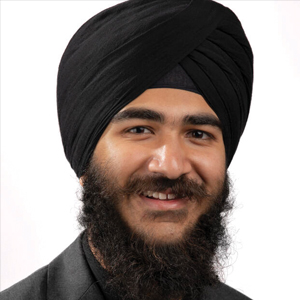
Anitvir Taunque, a biomedical science undergraduate at the Ohio State University, is among 60 aspiring public service leaders who have been picked this year as Truman Scholars. The scholarship will support their graduate studies. Other Indian American winners: Rincon Jagarlamudi (Vanderbilt University), Tej Patel (UPenn), Pranav Krishnan (University of Wisconsin-Madison), and Aravind Krishnan (UPenn).
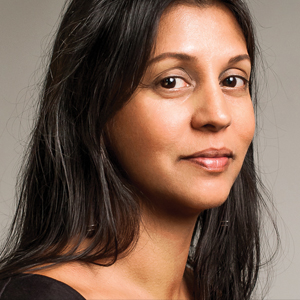
Sonia Shah, science journalist and author, is among this year’s 188 Guggenheim Fellows, each of whom will get a generous stipend to pursue independent work. Other Indian American awardees: Hari Krishnan (Wesleyan University dancer, choreographer, & educator); Nita Kumar (founder of arts and education nonprofit in Varanasi); and Vivek K. Goyal (Boston University engineering and computer science professor).
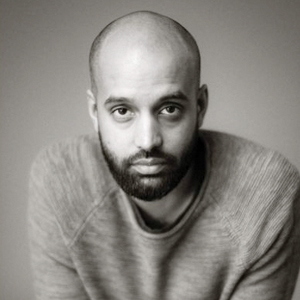
Shayok Misha Chowdhury won this year’s Whiting Award in the drama category. According to the award’s selection committee, he “writes with ruthless splendor and inventiveness about the borders of language, sexuality, the public self and the hidden life.” Chowdhury, who studied drama at Columbia University, received $50,000 for Public Obscenities (which, interestingly, is a bilingual play). He’s also won an Obie Award.
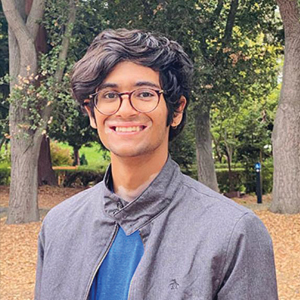
Arman Kassam (Stanford, BA in history) is one of 26 American citizens who will be heading to the University of Cambridge this year as Gates Cambridge Scholars. Other Indian American winners: Sadhana Lolla (MIT, computer science) and Ishan Kalburge (Johns Hopkins, engineering). They’ll join 50 more scholars from other parts of the world. The Bill and Melinda Gates Foundation is funding their graduate studies in the U.K.
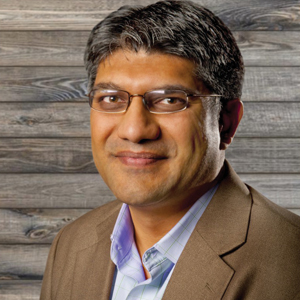
Jigar Shah, director of the U.S. Department of Energy’s Loan Programs Office, was picked for Time magazine’s “100 Most Influential List 2024.” Other honorees of South Asian descent: World Bank president Ajay Banga, Indian wrestler Sakshi Malik, filmmakers and actors Alia Bhatt and Dev Patel, U.K.-based restaurateur Asma Khan, Yale astrophysicist Priyamvada Natarajan, and Microsoft CEO Satya Nadella.
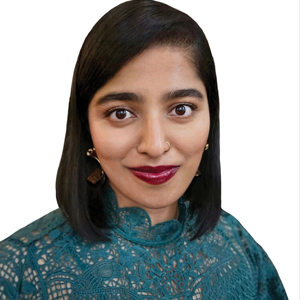
Keerthana Hogirala, who’s heading to the University of Chicago for her MBA/MPP, is among this year’s 30 Soros Fellows, each of whom gets up to $90,000 to fund their graduate studies. It’s open to immigrants and their kids. Other Indian American winners: Ananya Agustin Malhotra (Yale), Aayush Karan (Harvard), Akshay Swaminathan (Stanford), Malavika Kannan (Stanford), and Shubhayu Bhattacharyay (Harvard).
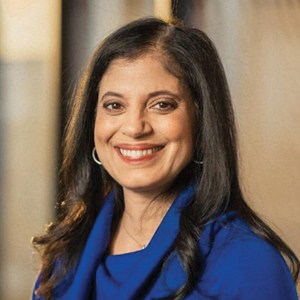
Ramani Durvasula, a licensed clinical psychologist in Los Angeles, has a YouTube channel that has received millions of views. The host of a podcast called Navigating Narcissism with Dr. Ramani, she also offers a popular online program. She is the founder and CEO of LUNA Education, Training & Consulting. Her fourth book, published this year by The Open Field, is titled It’s Not You: Identifying and Healing from Narcissistic People.
>> >> >> >>
INNDER IN DEUTSCHLAND: A GROWING TREND?
 Are Indians really moving to Germany? You wouldn’t think so if you saw this Wall Street Journal headline: “Indian Immigrants Discover Germany Is No Promised Land.” But that article was published in 2002, just two years after Germany introduced a permanent resident card scheme to attract high-skilled immigrants. During a time when the slogan “Kinder statt Innder” (“Children, instead of Indians”) was still in vogue, immigrants like the family profiled in the article found a cold welcome. Basic tasks—getting a driver’s license, opening a bank account, even getting directions—were a challenge, mainly because of the language barrier. The family couldn’t make friends—and perhaps most surprisingly, to get a birth certificate for their daughter, they had to pick a name from an approved list. They decided to go back to India.
Are Indians really moving to Germany? You wouldn’t think so if you saw this Wall Street Journal headline: “Indian Immigrants Discover Germany Is No Promised Land.” But that article was published in 2002, just two years after Germany introduced a permanent resident card scheme to attract high-skilled immigrants. During a time when the slogan “Kinder statt Innder” (“Children, instead of Indians”) was still in vogue, immigrants like the family profiled in the article found a cold welcome. Basic tasks—getting a driver’s license, opening a bank account, even getting directions—were a challenge, mainly because of the language barrier. The family couldn’t make friends—and perhaps most surprisingly, to get a birth certificate for their daughter, they had to pick a name from an approved list. They decided to go back to India.
It’s a different story now. As the BBC points out, “Indians now rank as the top immigrant earners in Europe’s largest economy.” According to the German Economic Institute, which calls immigration from India “a great success for Germany,” as of March 2021, 57.6% of Indians required to make social insurance contributions in Germany had advanced university or vocational degrees (it was 28.3% for German nationals). And unlike most Germans, Indians buy property. In 2022, Indians got 17,379 work visas, the highest share among all foreigners.
Indian students are also flocking to Germany, not least because of the EU Blue Card. Available to university graduates and foreigners with special skills, it is similar to the green card issued here. An estimated 43,000 Indian students (the largest among all foreign groups) are pursuing their education in Germany, where they’re heavily represented in engineering (60%), followed by law, management and social studies (22%).
/|\ /| \ /|\ /| \
INDIAN ELECTIONS: LARGEST, NOT LONGEST

India’s general elections began on April 19, but voting is far from over in the world’s most populous democracy. The electorate’s sheer size—almost 970 million in 2024—makes the process lengthy. Security is a challenge, and so is the management of a complex operation in a multilingual nation where the infrastructure ranges from excellent to nonexistent. A polling booth has to be available to all eligible citizens within two kilometers of where they live. All voting will end on June 1. That’s a total of 44 days spanning seven phases, though each phase lasts only one day. This isn’t even the longest election, but it’s the largest because of the growth in population. The Lok Sabha (Lower House) has 543 seats, and the BJP—with Modi expected to return as the prime minister for his third consecutive term—will no doubt get the most seats.
In 2014, the BJP got 282 seats in the Lok Sabha. That went up to 303 seats in 2019. To retain power, it only needs 272 seats. No other Indian prime minister since Jawaharlal Nehru, who was in office for the first 17 years, has been more dominant than the polarizing Modi. Even Indira Gandhi, arguably, couldn’t match him in her heyday. The historian Ramachandra Guha, reflecting on Modi’s style of governance, described him as “Indira Gandhi on steroids.” Nehru was such a larger-than-life figure that in the first general elections—India’s longest, stretching for four months from October 1951 to February 1952—his party (Indian National Congress) won 364 seats in the Lok Sabha, which back then had a total of 489 seats. It was conducted in a whopping 68 phases.
& & & & & & & & & &
BOOK MATTERS
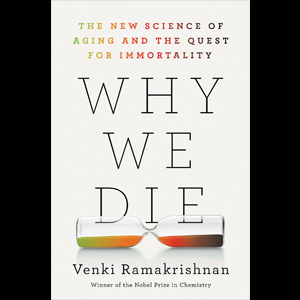
Why We Die: The New Science of Aging and the Quest for Immortality (William Morrow), by Venki Ramakrishnan. Aging, the author points out, is mostly about “how our body regulates the production and destruction of proteins.” This co-winner of the 2009 Nobel Prize in chemistry should know, given his lifelong interest as a researcher in how proteins are made in body cells. While we tend to keep death at a distance with euphemisms—gone, passed away, departed—we know it can’t be avoided. But can we prolong life? We’ve already seen much progress because of medical advances and improvements in public health. And now we have the genetics revolution. In the last decade, Ramakrishnan notes, over 300,000 scientific articles on aging have been published. Avoiding the hype and hucksterism of the anti-aging industry, he approaches the subject with the rigor of a scientist who has no motive beyond gaining a better understanding of life—and death. Bestselling authors Bill Bryson and Siddhartha Mukherjee, among others, have praised the book.

My Name Is Long as a River (Penguin Workshop), by Suma Subramaniam. Her name, long like a river, is Kaveri Thanjavur Jayalakshmi Ganesan. But her short name is not Kaveri or KTJG. Kav, as she’s called, learns about her heritage as she travels down the river she was named after. This picture book for the younger set (4-8 years) was illustrated by Tara Anand, who graduated from the School of Visual Arts in New York. Subramaniam, who lives in Seattle, has written other books for young children, including The Runaway Dosa and Namaste Is a Greeting. Also: The Cobra’s Song, Supriya Kelkar’s middle-grade book (8-12 years), is out in paperback this month. Geetanjali, aged 10, belongs to a family of singers. In a folklore-inspired story, she overcomes her fears and finds her voice. According to Booklist, it “will be relatable to anyone who’s ever felt nervous about new experiences or family expectations.” Kelkar, who grew up in the U.S., has worked as a writer for Hindi films.
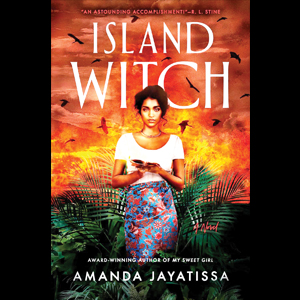
Island Witch (Berkley), by Amanda Jayatissa. Another title for this psychological thriller could be Island Gothic. Set in Sri Lanka—and inspired by the island’s folklore as well as Stephen King’s debut novel, Carrie, which turns 50 this year—Jayatissa’s novel takes us to the 19th century. Amara is the daughter of a village demon-priest who’s been sidelined by the British colonizers. They’ve brought their own superstitious beliefs to the island. Amara keeps a low profile, but that changes when there are savage attacks on the local men, creating fear and paranoia. It’s a horror story suffused with supernaturalism. Instead of turning to the demon-priest for help, as they’d have done in the past, the villagers turn on him. When Amara tries to help, the tension rises in a novel that “is both a dizzying hall-of-mirrors page-turner and a cutting examination of privilege, power, and complex female friendships,” notes Andrea Bartz. Jayatissa, who grew up in Sri Lanka, won the International Thriller Writer’s Award for My Sweet Girl. She currently lives in Portugal.
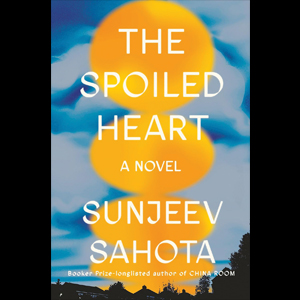
The Spoiled Heart (Viking), by Sunjeev Sahota. Following the success of China Room and The Year of the Runaways (shortlisted for the Booker Prize), this British Indian author is back with a well-timed novel. DEI (Diversity, Equity, and Inclusion) has become a hot-button issue, with archconservatives like Gov. Ron DeSantis calling it “Discrimination, Exclusion, and Indoctrination.” In the novel, set in a British industrial town, Nayan Olak is running for the general secretary position of a labor union. So is Maya, a well-educated woman from a different socioeconomic background. Class is at the center, but race also plays a role. The narrator is a writer named Sajjan (Sahota?), who knew Nayan when they were young residents. The novel “cuts to the merciless core of the culture wars, engaging with issues of loyalty, identity, inequality and community, and tracing the unforeseen consequences of actions that ripple through the years,” notes The Bookseller magazine in the U.K.
Enjoyed reading Khabar magazine? Subscribe to Khabar and get a full digital copy of this Indian-American community magazine.
blog comments powered by Disqus










